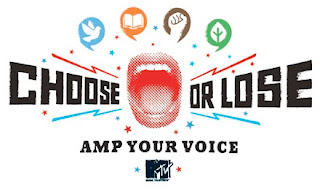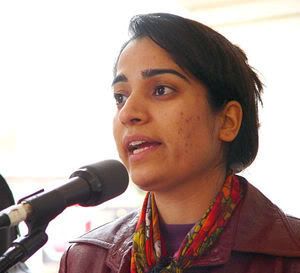Author's posts
Dec 23 2007
Blog Voices go MTV – 12/23/07
Will young people in this country engage in the political change process? They will if Nezua at The Unapologetic Mexican and Kyle at Citizen Orange have anything to say about it.
These two powerhouse voices of the diversosphere have been chosen by MTV to be part of the Street Team ’08 that inlcudes 51 young vloggers who will cover the presidential election through next November.
The presidential candidates can run, but it will be hard for them to hide from the horde of citizen journalists tapped by MTV’s Choose or Lose ’08 to cover the race for the White House. A group of 51 youth reporters – one from each state and Washington, D.C. – will follow the 2008 elections and deliver weekly multimedia reports tailored for mobile devices.
Using short-form videos, blogs, animation, photos and podcasts, the reports will be distributed through MTV Mobile, Think.MTV.com, more than 1,800 sites in The Associated Press’ Online Video Network and a soon-to-launch Wireless Application Protocol site. The Street Team ’08 reporters were carefully selected after an extensive nationwide search, and they represent every aspect of today’s youth audience – from seasoned student-newspaper journalists to documentary filmmakers, the children of once-illegal immigrants and community organizers.
They are conservative and liberal, from big cities and small towns, but all are tied together through a passion for politics and a yearning to make the youth voice heard during this pivotal election. The correspondents will begin reporting early next month after an intensive MTV News orientation in New York, during which they’ll be armed with laptops, video cameras and cell phones and challenged to uncover the untold political stories that matter most to young people in their respective states.
Dec 17 2007
Cool Yule
For reasons of timing and geography, I’ll be celebrating the holidays this week. One of the things I’m repeating from last year is that several people will recieve cd’s of music I’ve put together for them as gifts. Today I’ve been finalizing all those and thought it might be fun to share some of the music with all of you here.
I’ve made a holiday playlist that I’m calling “Cool Yule” after miss Bette’s recent rendition:
How about a little coolness from the great Luther Vandross?
Dec 16 2007
Simon: On the End of the American Empire
I am wholly pessimistic about American society. I believe The Wire is a show about the end of the American Empire. We are going to live that event. How we end up and survive, and on what terms, is going to be the open question.
David Simon, creator of “The Wire”
This week I spent every evening watching the dvd’s of the fourth season of HBO’s “The Wire.” I know that Armando plans to write about the fifth season that starts January 6th, so I thought I’d give some background about how the creator has envisioned the show and its purpose since it seems to echo so many of the themes that we talk about here.
The quote above is from a speech David Simon made over a year ago at Loyola University. If you’ve got half an hour, I’d highly recommend watching the three segments of this on youtube here, here, and here. I’ll summarize some of his main points. But of course, I can’t do the whole thing justice in a few words.
Simon explains the reasons for the end of the American Empire this way:
Dec 12 2007
Leaving Our Most Vulnerable Children Behind – UPDATED
How to write when the rage is boiling? I don’t know, but I’ll try. There is some news out today that will drastically affect child welfare all over this country in the next few months because of decisions our Congress made almost two years ago. But I can’t find a word about it in the Washington Post, the New York Times or the Los Angeles Times. Granted, to understand how this happened and how children will be affected takes some time to explain. But still…
If you’ll bear with me for a moment, I’ll tell you what happened.
Back in January 2005, Congress passed and Bush signed a budget reconciliation bill. I don’t know if any of you remember that bill, but it included cuts in funding to programs like student loans, child support and other safety net services. These cuts were needed in order to continue to grant the wealthy in this country additional tax cuts.
A somewhat obscure cut was made in Medicaid to a program called Targeted Case Management. This funding, which must be matched by local jurisdictions, has been used all over the country to pay for services to our most vulnerable populations: victims of child abuse, the mentally ill and retarded adults.
So, you might ask why I’m writing now about cuts made back in 2005. Good question. Because it has taken this long for the feds to issue a ruling on how this cut will be administered. Just last week the ruling was issued to take effect March 4th. Each state uses this funding differently, so you might need to check in locally to determine what will be the effect in your area. According to an article in the Star Tribune,
The rule apparently will cut about $50 million in federal Medicaid money for an innovative service that helps 70,000 troubled, abused or foster children and their families in Minnesota.
Dec 09 2007
Musings on Peacemakers
Today I’d like to write about peacemakers – who are they and what do they do? And no, not the kind that try to avoid conflict – but the kind that take on the war machine and attempts by the powerful to marginalize whole groups of people. The more I look into this, the more I see that there are peacemakers of all kinds who find their own various paths to peacemaking.
A few months ago I found a wonderful site that many of you might know of already, peaceCENTER. They have a list of peace heroes with short bios about their contributions to the world. I know you could never do an exhaustive list of peacemakers, but this one inspired me in all its wonderful history and diversity. Of course it includes the names of those we cherish in this work, like Martin Luther King, Jr., Mahatma Gandhi, Cesar Chavez, Bishop Oscar Romero, Henry David Thoreau, Bishop Desmond Tutu and The Dalai Lama. But how about some of these names?
Dec 07 2007
Facing the fear…a journey out of authoritarianism
My training and much of my professional life was spent as a Family Therapist. The whole point behind this kind of practice is to look at how family systems operate in order to better understand an individual’s behavior. In other words, most of what we do is not done in a vacuum, but is influenced by the behavior of those around us. Since our families are the people we spend the most time with, we tend to develop systems of response to one another that can be rather entrenched and difficult to change.
For years I worked with families as a way to address the needs of troubled kids. It was great work and I really learned alot. But I think that ultimately, my mind wanted to go bigger than just looking at individual family systems. I think our communities and culture are systems as well that operate much the same way families do. So, for example, these days, instead of just looking at the fact that we have an epidemic of seeing our children labelled with things like AD/HD, Depression, Eating Disorders, etc, I think about how our culture is AD/HD, Depressed and has an Eating Disorder.
So you might begin to see how my training and my interest in politics comes together. This led me recently to a look at the research that has been done over the last 60-70 years about the Authoritarian Personality. John Dean wrote a book about it titled Conservatives Without Conscience and by now most of us are somewhat familiar with the concept. But in case you’re not, I’ll give you a little overview.
Dec 04 2007
You cannot stop the coming of spring
Malalai Joya has been called “the bravest woman in Afghanistan” by many in the media. When you hear her story and read her words, you’ll know why.
Born in Afghanistan in 1978, Joya’s family escaped to the refugee camps in Iran and Pakistan in 1982 during the Soviet invasion. When she was 20 years old, her family returned to Afghanistan, where she became a vocal opponent of the Taliban and worked to establish an orphanage and health clinic.
In 2003, Joya was elected delegate to the Loya Jirga convened to ratify the Afghan Constitution, where she spoke out publicly against the involvement of warlords and was summarily dismissed.
Here’s how World Pulse Magazine reported the incident:
When her time came to make her 3-minute statement, she tugged her black headscarf over her hair, stepped up to the microphone, and with emotional electricity made the speech that would alter her life.
After she spoke, there was a moment of stunned silence. Then there was an uproar. Male mujahideen, some who literally had guns at their feet, rushed towards her, shouting. She was brought under the protection of UN security forces.
In a nation where few dare to say the word “warlord” aloud, Joya had spoken fiercely against a proposal to appoint high clergy members and fundamentalist leaders to guide planning groups. She objected that several of those religious leaders were war criminals who should be tried for their actions-not national heroes to influence the new government.
Despite the commands of Assembly Chairman, Joya refused to apologize.
Dec 03 2007
A Deeper Feminism
I will fight to the end for a woman’s right to choose, for equal pay and rights in the workplace. I think we need to go a bit farther in providing families with adequate time off from work to care for a loved one and most of all, I think we need to protect women from rape and domestic violence.
But I don’t think that goes far enough. Last night I was reading We Are The Ones We Have Been Waiting For by Alice Walker and she told this story about the Swa people of the Amazon:
They tell us that in their society men and women are considered equal but very different. Man, they say, has a destructive nature: it is his job therefore to cut down trees when firewood or canoes are needed. His job also to hunt down and kill animals when there is need for more protein. His job to make war, when that becomes a necessity. The woman’s nature is thought to be nurturing and conserving. Therefore, her role is to care for the home and garden, the domesticated animals and the children. She inspires the men. But perhaps her most important duty is to tell the men when to stop.
It is the woman who says: Stop. We have enough firewood and canoes, don’t cut down any more trees. Stop. We have enough meat; don’t kill any more animals. Stop. This war is stupid and using up too many of our resources. Stop. Perkins says that when the Swa are brought to this culture they observe that it is almost completely masculine. That the men have cut down so many trees and built so many excessively tall buildings that the forest itself is dying; they have built roads without end and killed animals without number. When, ask the Swa, are the women going to say Stop?
Indeed. When are the women, and the Feminie within women and men, going to say Stop?
Dec 02 2007
Blog Voices This Week 12/2/07
When I started writing this weekly essay, the idea was to travel around the “diversosphere” and catch interesting items so that we could bring those voices here. I’ve focused mainly on blogs written by people of color and hoped that we could highlight some of the excellent stuff that’s going on, whether it was a news story about people of color that the msm had missed, or a challenge to the dynamics of racism in our culture.
But we’ve had an interesting week on that issue right here in our little corner of the world. I know there’s been a lot of heat related to the topic and the personalities involved. But in the midst of it all, there was some amazing wisdom shared and … change happened.
So, this week, I’d like to congratulate everyone for hanging in there. To do so, I thought I’d stay right here this week and bring you a few of the kernels of wisdom that were shared by some of our own dharmaniacs.*
Lets start with da boss who, despite being sleep-deprived and weary from playing referee, was able to contribute more than a few nuggets of his own.
White people…IN GENERAL….are the undoubted oppressors and beneficiaries when it comes to issues of race. We never can experience racism (in this country) because we are ‘the majority’ and have lived in a racially blind culture all of our lives.
Due to that cultural fact…..We simply cannot judge ourselves objectively enough to determine whether we have engaged in racist behavior or not. We can try our absolute best, but imo, we must ALWAYS take that sort of observation of our behavior VERY seriously and never assume that we are in the right.
The culture conditions us to racism, and it is our individual responsibility to make sure we haven’t and don’t fall into the cultural traps. No matter how good our intentions and no matter how much we have done in the past to combat it within ourselves.
And besides…why is sitting down and taking a good hard look at yourself vis a vis racism such an odious task that it should be avoided?
Now, I’ll travel around to a few of the pertinent essays and give you some more gems.
Nov 30 2007
A Truce???
In Armando’s diary this morning, Stranger in a Strange Land asked if there was a possibility for a truce on some of the issues that have been dividing us about race. I see that there are arguments to be made on both sides for many of the people commenting and think we might be able to get at least a majority of people to agree. Here’s my comment:
How about we
identify some stipulations for a “truce” and see if folks want to sign on.
I’d say I see two possibilities in this thread:
1. We need both personal change and legal/structural change to solve the problem of racism. Neither one is going to be completely effective alone.
2. The Latino youth in the library needed to be held accountable for his behavior AND given the opportunity to have someone validate the racism he lives with.
Nov 30 2007
How I De-Lurked
I want to make a point, but in order to do so, I’ll have to give you some background. So I hope you’ll stick with me.
I was born into a family with several large personalities. Somehow, very early on, I decided to stay in the background and observe. Oh, and did I mention that those large personalities were pretty dysfunctional. I guess it seemed safe to stay out of the fray. And given that those large personalities were also kool-aid drinking right wing christian fundamentalists, it might have been the reason I managed to escape the cult. So all in all, I think it was a pretty good decision.
It wasn’t until I was almost 30 that I started to speak up. The story about how that happened should probably be saved for another essay, but suffice it to say, I learned to trust my own voice.




